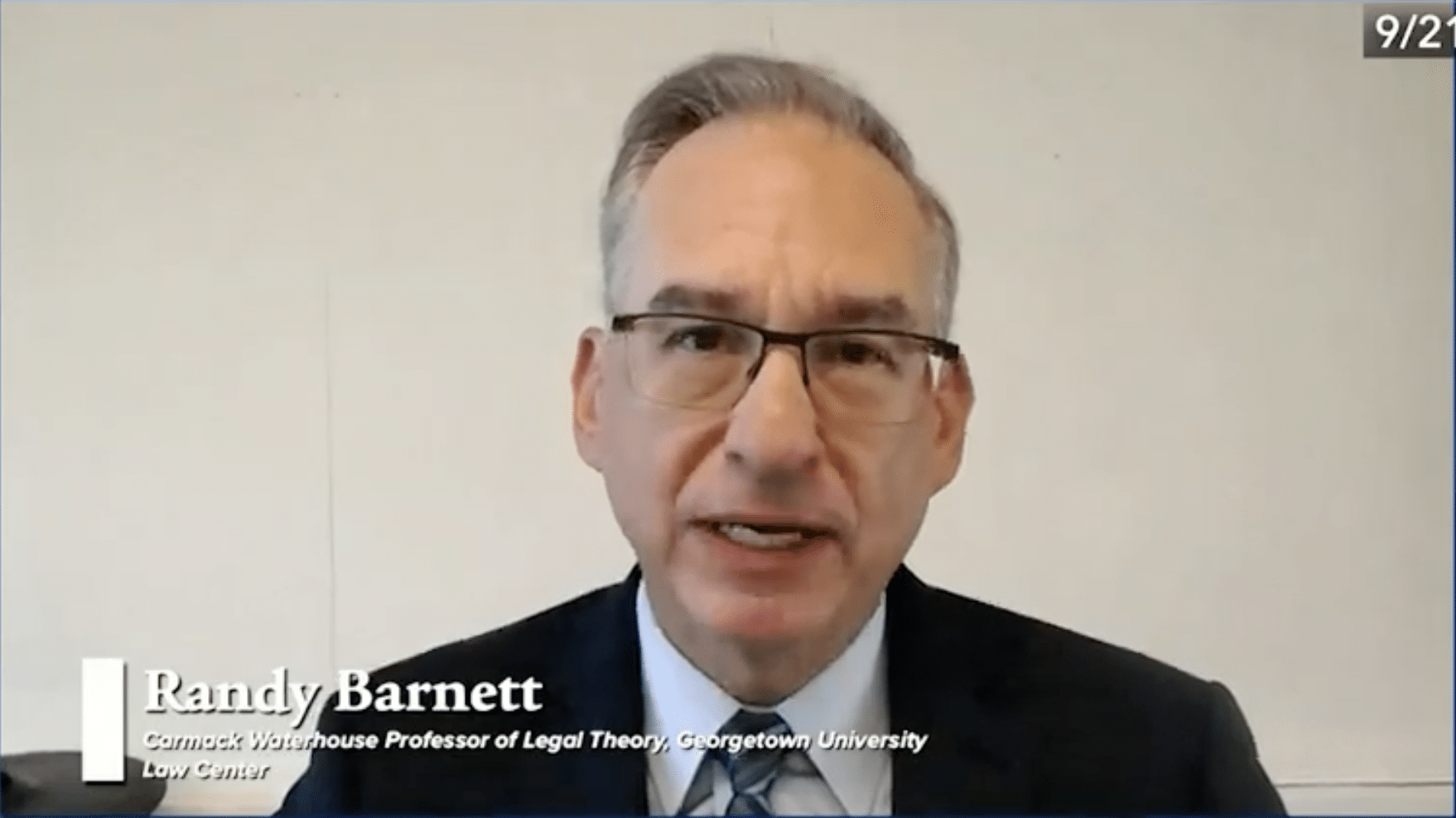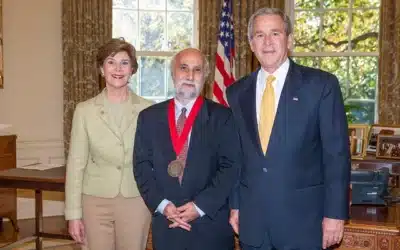Randy Barnett is arguably on the short list of the libertarians most influential in American public life. His legal scholarship has informed challenges to state power in the courts; indeed, he himself has argued before the Supreme Court. He has been an active participant in intra-libertarian theoretical debates for decades. And his book The Structure of Liberty, now in its second edition, articulates a clear and appealing model of a stateless legal order that has contributed helpfully to libertarian theory over the course of a quarter-century.
Thus, when Barnett urges, as he does in a new essay, that it’s time to update libertarianism, people will understandably listen. It’s not clear, however, that we ought to embrace his proposed program.
Barnett’s principal focus is on the shape of libertarianism in a non-libertarian world. But he begins by urging libertarians to embrace natural-law foundations for their position—something that doesn’t seem any more or less relevant in our second-best world than it might in a fully libertarian one.
Barnett is surely right that a full-blown natural-law theory offers an appealing account of the good life that can help to address people’s desires for meaning and comprehensive flourishing. At the same time, there’s no reason to expect a political theory as such to offer such an account. A natural law account—mine, Roderick Long’s, the one Barnett recommends (the one advanced by Rasmussen and Den Uyl), or another—can certainly ground a rich conception of flourishing human life and an appealing political theory. But the political theory itself can hardly be expected to do so. Libertarianism, however grounded, certainly has implications for social life outside the political sphere. Libertarians don’t want to see people pushed around by social hierarchies any more than they want to see people pushed around by states and recognize the exceptional benefits of social experimentation; we should certainly commend the broader libertarian ethos and not merely libertarian politics. That’s different, however, from advancing a package including not only a distinctive social and political vision but also a complete moral theory. I can strongly favor such a theory without believing that it’s best advocated as integral to libertarian politics.
Libertarians like Michael Huemer have rightly emphasized the moral equivalence between state actors and others, challenging states because the behavior of state actors is systematically inconsistent with the moral limits to which we believe people in general should adhere while lacking anything like the special justification this sort of inconsistency would seem to require. That’s one reason it seems less interesting to me than it appears to seem to Barnett that we live in a world of states. Barnett wants us to work with them. But it’s not clear why we should ignore the fact that states are exercises in large-scale thuggery. They are engaged in plunder, predation, enslavement, and murder. They are illegitimate because they lack foundations in the actual consent of those they seek to govern. They are, in effect, massive criminal gangs.
Barnett thinks states can be somewhat legitimate, entitled to obedience, in some cases, when they are likely to be reliable rights-protectors. But this doesn’t seem terribly relevant when states are actively engaged in rights-violations and when they are likely to do so systematically and on an ongoing basis.
A criminal gang can of course do useful things. It can restrain other such gangs, for instance. But this doesn’t render it anything other than a criminal gang. We will have reason to cooperate with it in some cases—when it offers actual protection against unjust violence, for instance. But we will have no reason to treat it as harmless or legitimate, to endorse its actions except when those actions are themselves consistent with the demands of morality. We will have no duty to obey it.
I’m an anarchist. But libertarians who believe there can be a legitimate state that can and must operate within narrow moral constraints—libertarians like Robert Nozick, Jacob Hornberger, or any of various thinkers in the Objectivist tradition—will have every reason to regard real-world regimes with much the same suspicion as the anarchist would. They will have little reason to join Barnett in accepting the legitimacy of regimes that don’t respect robust moral limits.
States are systematically unjust. But Barnett wants to affirm a libertarian account of citizenship, and so to encourage us to recognize that there are not only natural but also civil rights—rights, that is, held in virtue of our status as members of particular states. He wants, in effect, to treat states as clubs, as membership organizations; thus, he can insist that “membership has its privileges.” The language of membership, evoking as it does the civics-class nostrum that “the government is us,” obscures the essentially adversarial and predatory relationship between states and their subjects. And the membership-oriented approach risks not only ignoring the illegitimate character and criminal operating pattern of states but also encouraging people to pursue “libertarianism in one country.” This kind of libertarianism fails to recognize the importance respect for the equal moral standing, the equal rights, of people without regard to their government-issued papers or the activities in which their nonconsensual rulers are engaged. It might lead to everything from immigration restrictions to sanctions to restraints on trade. (To be clear, Barnett doesn’t affirm any of these. My point is that “libertarianism in one country” could be hospitable to all of them.) “Libertarianism in one country” flies in the face of the moral universalism at the heart of the liberal tradition and begs the question as regards the authority of states to confer special privileges on putative members.
Barnett also urges us to rethink how we understand “public” facilities, suggesting that the use of some such facilities may rightly be subject to state regulation even if they are not state-owned.
He has long maintained that legal limits on how private owners regulate access to “public accommodations” should be seen as rooted in the common law rather than as products of recent legislative innovations. But whether or not this is the case is beside the point. That something is an aspect of longstanding common-law doctrine is insufficient to show that it is appropriately respectful of people’s autonomy, associative freedoms, and property rights.
Richard Epstein has made a strong case that mid-twentieth-century U.S. legal rules precluding discrimination in the provision of access to so-called “public accommodations” were justified given the background threat of violence that would have been directed at individuals who declined to discriminate and given the widespread, if covert, desire of merchants to see such rules imposed uniformly. (Merchants will have welcomed such rules both because of moral sensitivity and because discriminating will have cost them business.) However, even if Epstein has made out this case successfully with reference to a very specific historical context, it does not follow that treating access to public accommodations as ordinarily or in general a matter for government regulation has been shown to be reasonable on libertarian grounds. Ethics demands that owners provide access to such accommodations on a non-bigoted, non-prejudicial basis. But ethics also demands that physical force not be used against anyone’s body or possessions in order to prevent, end, or remedy immoral conduct that does not itself involve force or fraud.
Barnett suggests that libertarians should be concerned with corporate power, and he invites us to envision the horrific use to which such power might be put. He is surely right to be deeply troubled by the kinds of abuses in which some businesses could engage. But I wonder whether those abuses, when they occur in our world, are realistically conceivable apart from government threats on the one hand (as against social media platforms) and legally secured privileges (notably ones to intellectual property—perhaps an example of a Barnettian civil right) on the other. I also wonder whether the systemic effects of licensing state interference with corporate power in the way Barnett seems to envision would not simply lead to the further expansion of state power rather than the enhancement of liberty.
Barnett suggests that, unlike his younger self, he is convinced today that libertarians should be more concerned with liberty and less concerned with property. But I think we should reject this dichotomy. A genuinely just scheme of property rights determines the contours of what liberty—more precisely, that subset of liberty vindicable by force—amounts to.
Apart from a brief reference to a vigorously libertarian version of natural-law thinking, Barnett’s manifesto appears primarily to be a call for a more accommodating view of state power by libertarians. Barnett’s own commitment to freedom is undoubted, as are his scholarly credibility and intellectual heft. But I suspect that, even in the second-best world in which we find ourselves, we can pursue liberty without making the concessions Barnett wants to encourage.
































